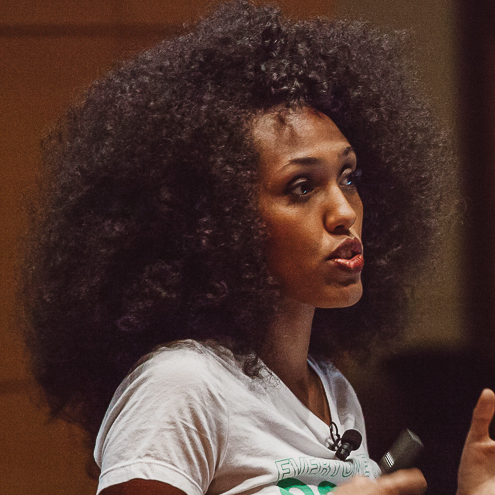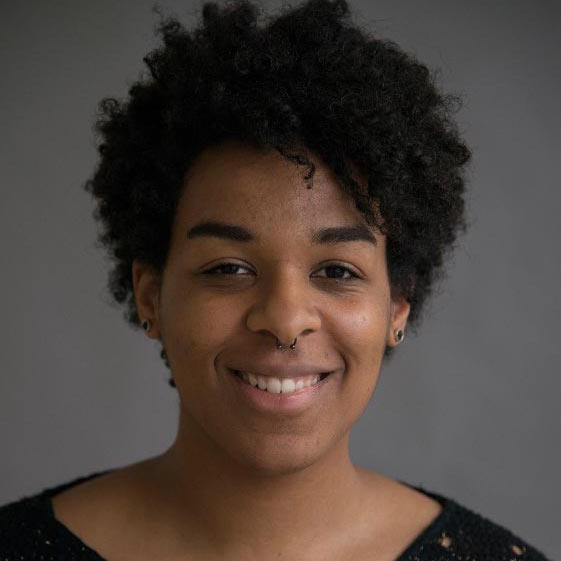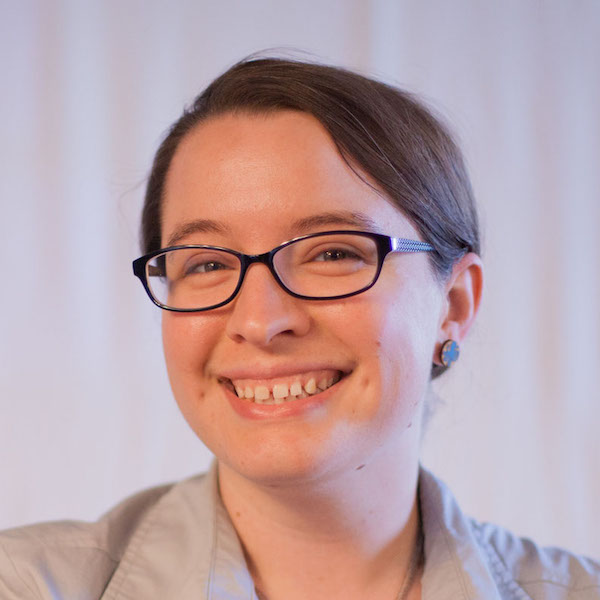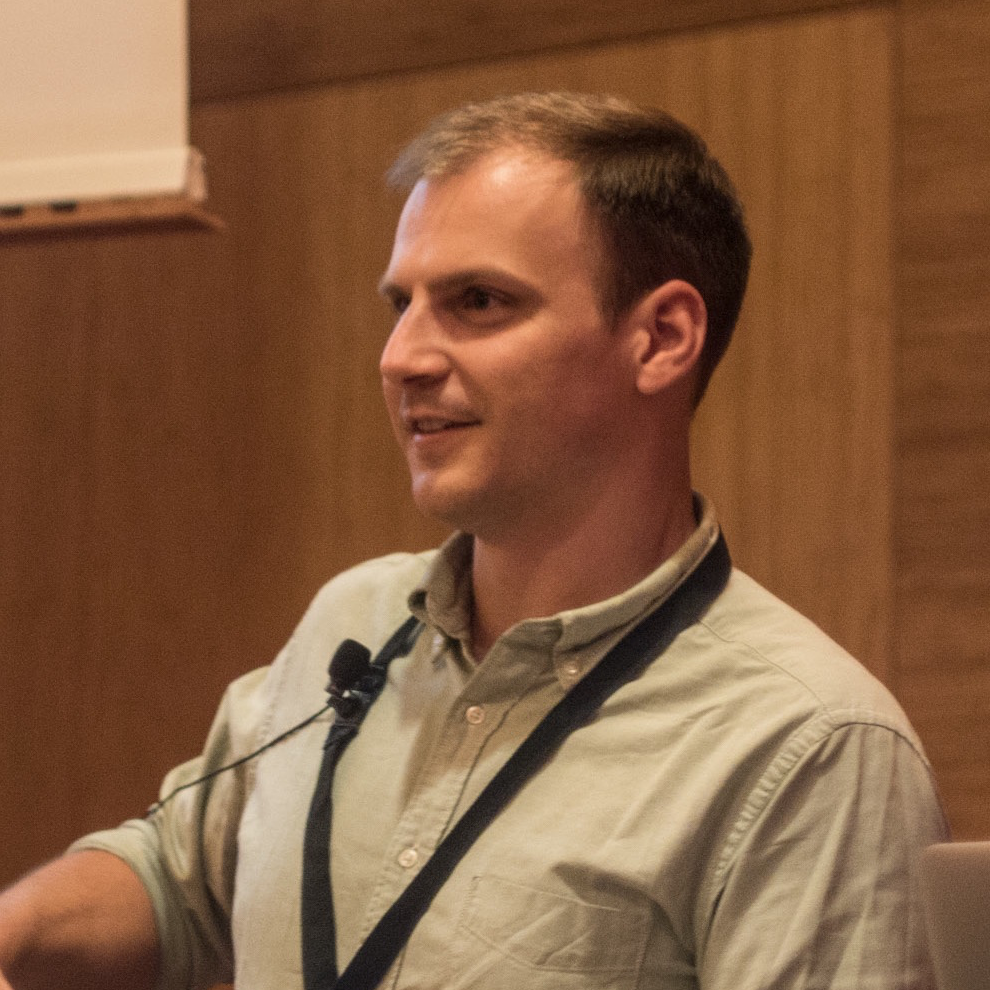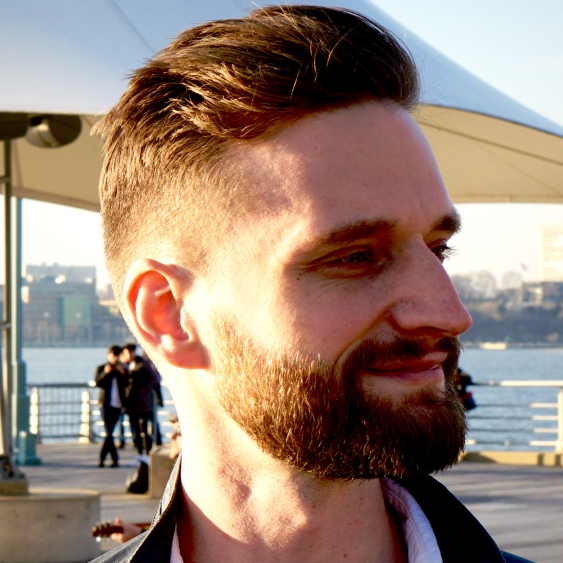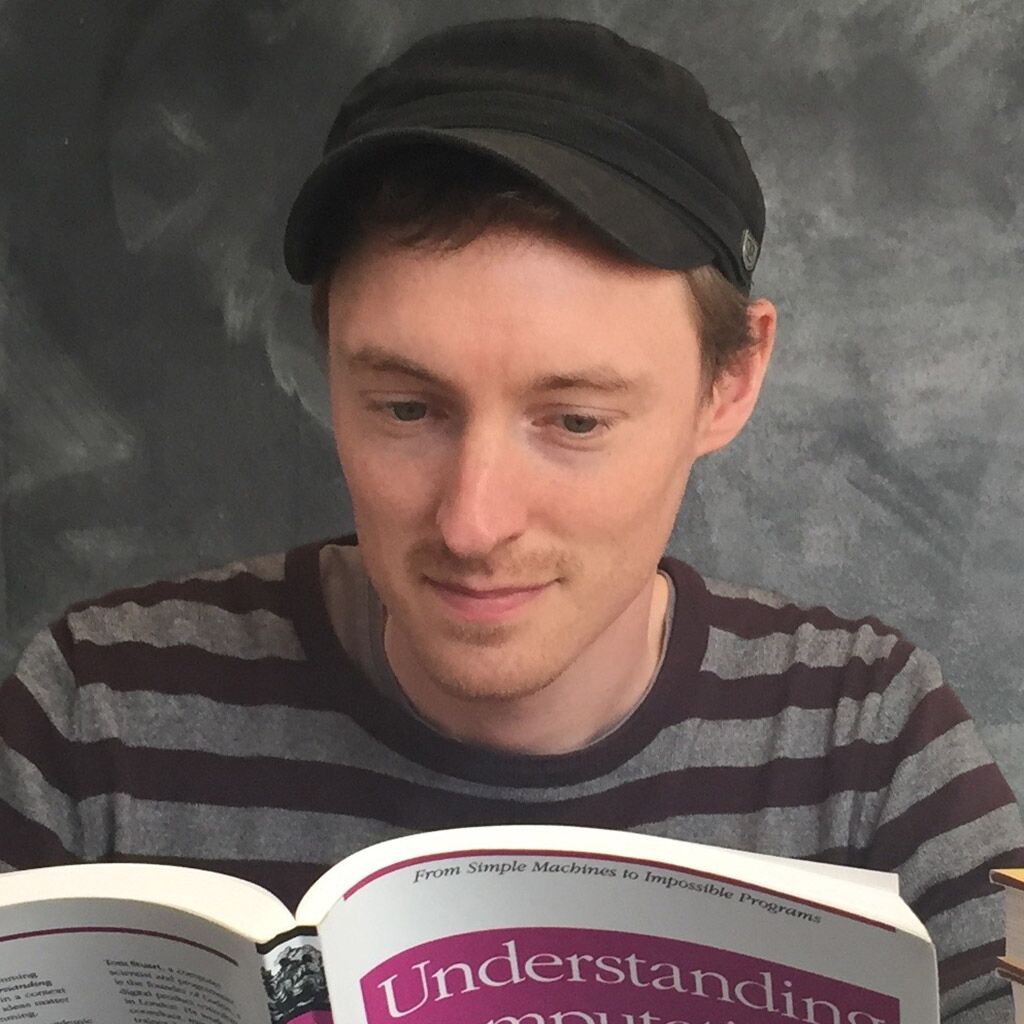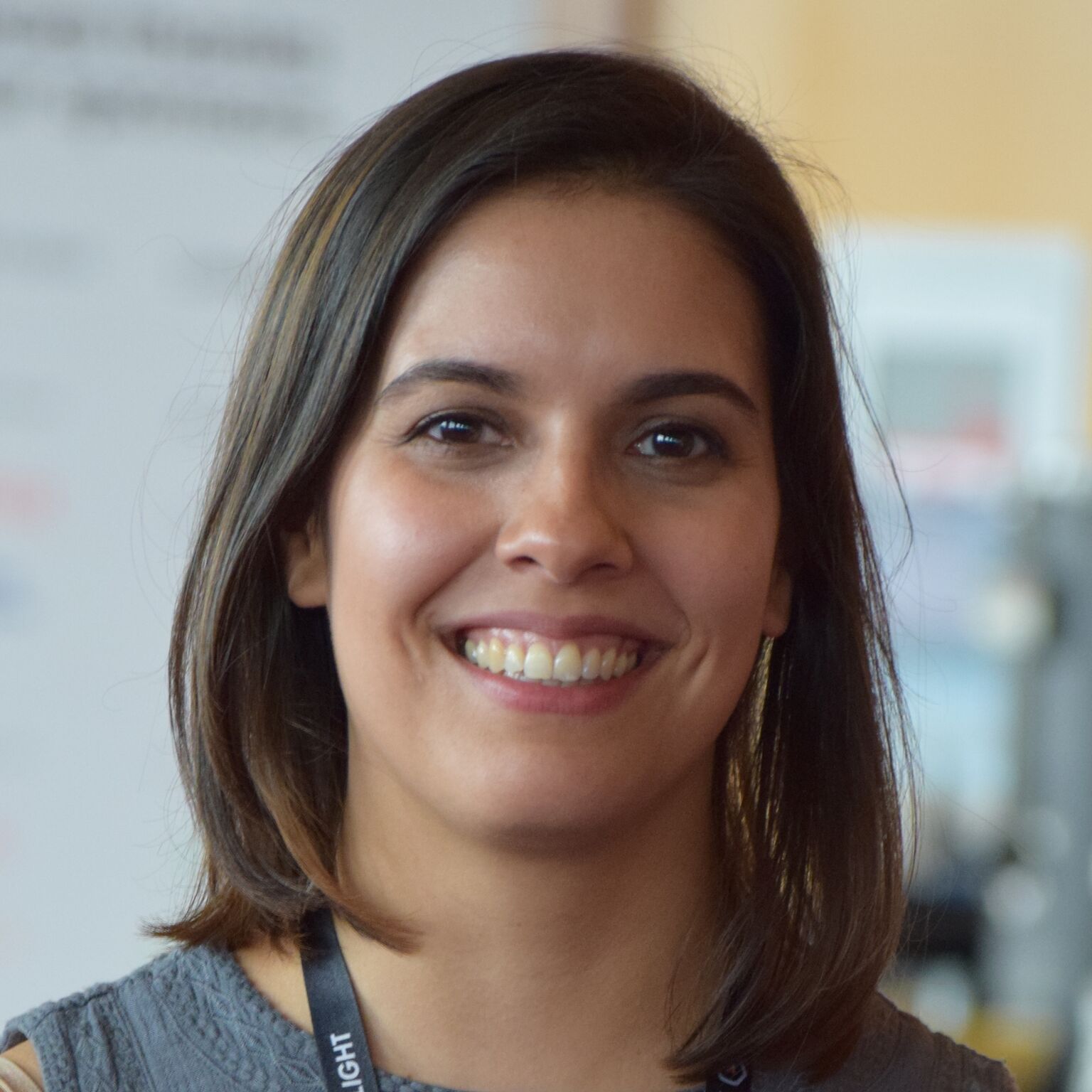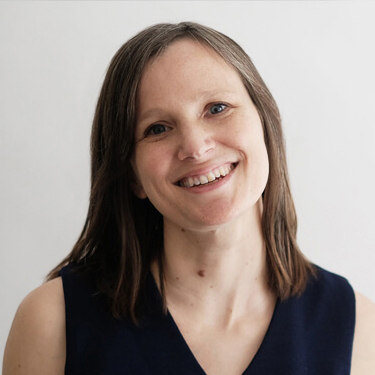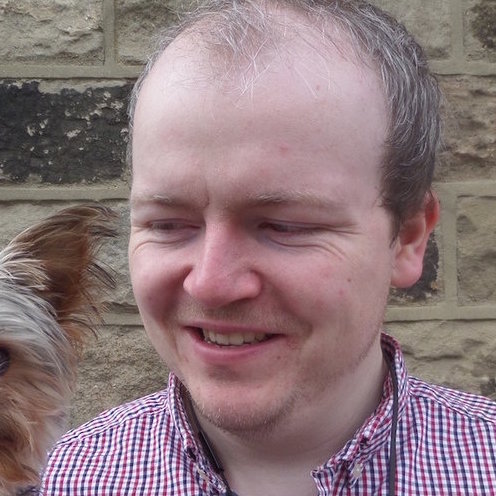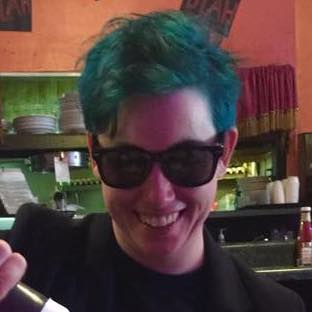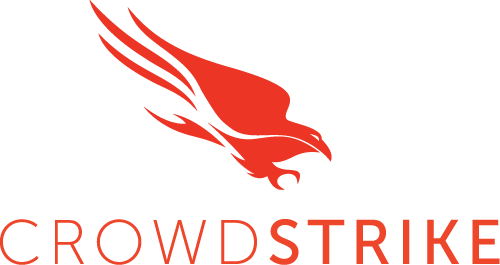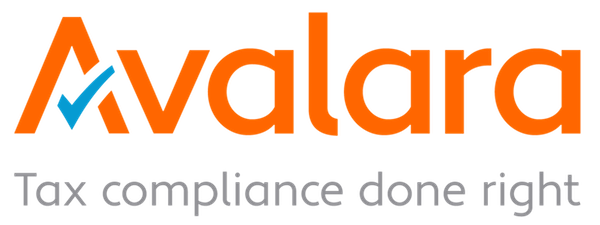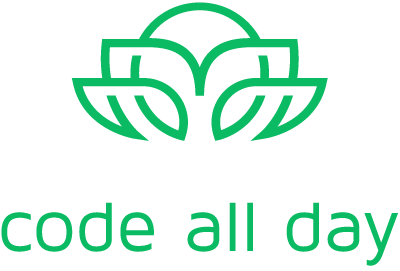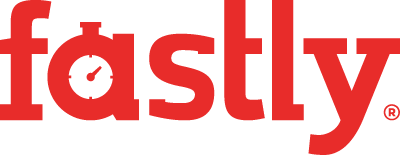-
Yehuda Katz
Yehuda is a member of the Ember.js, Ruby on Rails and jQuery Core Teams; his 9-to-5 home is at the startup he founded, Tilde Inc, where he works on Skylight, the smart profiler for Rails. Yehuda spends most of his time hacking on open source—his main projects, along with others, like Thor, Handlebars and Janus—and traveling the world doing open source evangelism work.
-
Opening Keynote
Join Tom and Yehuda for a review of Ember in 2017 and a look forward to the future.
-
-
Saron Yitbarek
Saron is a creator and founder of CodeNewbie, the most supportive community of programmers and people learning to code. She's also host of the CodeNewbie Podcast, co-host of the Base.cs Podcast, and producer of the Codeland conference.
-
Tom Dale
Tom is a member of the Ember Core Team. He's a former Apple engineer who first gained expert front-end JavaScript skills working on MobileMe and iCloud. He's a super hipster, and still isn't sure if it's serious or ironic.
-
Opening Keynote
Join Tom and Yehuda for a review of Ember in 2017 and a look forward to the future.
-
-
Vaidehi Joshi
Vaidehi is an engineer at Tilde, in Portland, Oregon, where she works on Skylight. She enjoys building and breaking code, but loves creating empathetic engineering teams a whole lot more. In her spare time, she runs basecs, a weekly writing series that explores the fundamentals of computer science, and is co-host of the Base.cs Podcast.
-
Gavin Joyce
Gavin hails from Dublin, Ireland and helps build amazing products at Intercom with Ember.js.
-
Smartphone Symphony
If Beethoven was alive today, he’d probably use Ember. Using Ember, socket.io, the web audio API, and devices in the audience's pockets, we'll interactively explore the challenges of creating a real-time and audience-driven musical performance, different parts of which are played across a symphony of all phones in the audience.
-
-
Jessica Jordan
Jessica is a software engineer from Berlin, Germany working at simplabs. She is part of the Ember.js Learning Team, co-organizing the monthly Ember.js meetup group in Berlin and she’s an editor at the Ember.js Times, the weekly newsletter on what happened in Emberland recently. Apart from that, Jessica is a big fan of CSS, art and comics.
-
Everything they didn’t tell you about the Ember Community
Everything they didn’t tell you about the Ember Community
The Ember community describes a worldwide subculture consisting of developers, contributors, bloggers, event organizers, podcasters and many others involved in activities around the framework. But which factors drive this complex community in its efforts?
After a retrospective of open-source activity in the ecosystem, we’ll see which core resources and addons are particularly popular and which topics are particularly interesting to the community. Summing up these findings, we’ll finally try to answer how diversity and growth of this community can be furthered even more in the future.
-
-
Edward Faulkner
Edward Faulkner is a member of the Ember Core Team and the creator of Ember's official animation library. His open source code is running on mainstream gaming consoles, major social media sites, and hordes of enterprise applications. His consultancy, Polynomial LLC, leads ambitious software projects for a diverse group of businesses and nonprofits.
-
Living Animation
Most animation on the web is canned, non-interactive, and inflexible. It doesn’t dynamically adjust itself to changing conditions and user interactions. It’s expensive to create and maintain because the programmer or designer is trying to micromanage the motion. It needs to be hand-tuned for each new feature, device, or media query breakpoint.
There is an alternative: we can think more like game designers. We can build robust, dynamic systems that animate gracefully, with clear separation between app logic and app motion.
-
-
Marie Chatfield
Marie Chatfield writes code and poetry, sometimes at the same time. Originally from Houston, she now lives and works in San Francisco. She is passionate about creating inclusive spaces, building empathetic and elegant software, and understanding Ember at a deeper level. If you see her in the hallway, start a conversation by sharing your favorite poem or piece of art!

-
Deep Dive on Ember Events
Advance your Ember events knowledge from entry-level to expert in 30 minutes! Start with the basics of DOM events, learn the lifecycle of event listeners in Ember, then peek under the hood to understand how Ember handles clicks in your application. What are the different ways of listening for events in Ember? How do they interact? What are the performance implications of each approach? What kind of bugs can you introduce if you don't understand them?
You'll be able to implement event listeners with confidence and debug with clarity once you have a complete mental model of Ember events!
-
-
Godfrey Chan
Godfrey Chan is a member of the Ruby on Rails core team and an Ember.js Core Team Member. He currently works at Tilde as an in-house Canadian. In his previous life, he was also an award-winning WordPress™ plugin author.
-
Prying Open the Black Box
When your code doesn't work the way you expect, it could be a frustrating exercise to figure out what exactly went wrong. In this session, we will walk through the process of debugging an Ember app. Along the way, we will learn about some of the tools and techniques that could help shed light on the behavior of our code. Finally, we will also take a brief tour into the Ember codebase to look for clues.
Upon completing this orientation, you will be well-equipped to pry open the mysterious black box the next time your app misbehaves!
-
-
Jen Weber
Jen Weber is a member of the EmberJS Learning Team. She works at BioBright, building applications that help scientists make new discoveries through data exploration and visualization.
-
Contributors Workshop
At the heart of open source are developers like you: people of all backgrounds, interests, and experience levels. In this 3-hour workshop, you'll learn how to contribute to Ember, meet the other developers who shape our favorite framework, and if you're up for the challenge, make a pull request!
The workshop will begin with some formal instruction. Where do you start? What goes into a good PR? Who will help? What knowledge or skills do you need before you jump in? (Spoiler alert—not a whole lot! Learning new things is part of the fun.)
The rest will be guided coding time. You'll have the opportunity to pair program or fly solo as you tackle an issue in Ember's learning resources or core code. Available issues will cover a wide range, appropriate for beginners and experts alike. A group of experienced contributors will be there to help debug, advise, and answer questions.
The workshop will include some formal instruction, guidance from a team of experienced contributors, and hands-on coding time. Attendees should bring a laptop, budget an hour of setup time in the week before the workshop, and watch for emailed instructions about setup.
-
-
Matthew Beale
Matthew is an Ember Core Team member and co-founder at 201 Created. He co-authored the authentication library Torii as well as the Mobiledoc document format and WYSIWYG editor. Matthew writes about the web at madhatted.com.
-
Who Moved My Cheese? Ember's New Filesystem Layout
Who Moved My Cheese? Ember's New Filesystem Layout
Ember's new filesystem layout, commonly called Module Unification, has arrived. Applications and addons alike have started to adopt the new convention. Why should you be looking at Module Unification? With the new layout we're bringing code bundling, improved namespacing for components, and a better integration path for addons to the framework.
-
-
Bear Douglas
Bear Douglas is an accomplished public speaker with nearly 15 years’ experience on stage and in the performing arts. In the past three years alone, Bear has given over 130 professional presentations to technical and non-technical audiences of all sizes. She currently leads the Developer Advocacy team at Slack; previously, she was at Twitter, Facebook, and a smattering of SF-based startups.
-
WHW, Public Speaking 101
This Workshop is open to members of the EmberConf Women Helping Women Program and all Women in the Ember community.
This fun workshop is a mix of lecture, exercises, and discussion, focused on practical techniques and principles that can help you level up your skills for speaking to any size of group. Learn how to adapt your body language and content to communicate effectively to dozens, hundreds, or thousands of people—and how to recover when things don’t go as planned.
Please note that this is a women-only event that intends an inclusive definition of women. We are welcoming and respectful of trans women and any others who identify as women in a way that is significant to them.
-
WHW, Telling Great Stories with Code
WHW, Telling Great Stories with Code
This Workshop is open to members of the EmberConf Women Helping Women Program and all Women in the Ember community.
Showing code is an integral part of telling technical stories- but showing code alone doesn't tell a story. This session will focus on how to use code within a technical presentation, from high-level concerns, like where and how to use code and architecture diagrams in your talk, to the nitty-gritty details of using Keynote's slide builds and transitions to make code digestible at a glance. This session will primarily be practical, so bring a deck you'd like to polish, or come prepared to create something new.
Please note that this is a women-only event that intends an inclusive definition of women. We are welcoming and respectful of trans women and any others who identify as women in a way that is significant to them.
-
-
Sam Selikoff
Sam Selikoff is a co-founder of EmberMap, a video training site for Ember.js teams. Previously a front-end engineer at TED, he now spends his time sharing his knowledge with the Ember community through videos, blog posts, and consulting.
-
A: Advanced Mirage
In this interactive training, we'll code our way through several exercises as we learn some advanced techniques for working with Ember CLI Mirage.
Mirage makes it easy to wire up a simple mock server, but eventually there comes a time in every application where more work is needed to faithfully represent certain resources and operations. Once you learn a few of these techniques, you'll be able to write complex custom route handlers in no time.
During this training you will learn how to
- Use higher-order functions to simplify custom route handlers
- Customize serializers to make Mirage match a custom backend
- Work with complex model schemas that include things like polymorphic and one-way associations
- Writing useful factory traits that simplify data creation and clarify tests
and more. By the end of the exercises, you'll
- Feel more confident working directly with Mirage's ORM
- Have a better understanding of JSON:API
- Be able to set up isolated Mirage servers, which are useful in integration or addon tests
This is a chance to improve not only your knowledge of Mirage but also your capabilities with vanilla JavaScript, as some of the most useful Mirage techniques boil down to writing functional, composable JavaScript transforms.
Bring your questions and take this unique opportunity to learn directly from Mirage's creator. Expect to walk away with a better understanding of Mirage's internals and feeling more confident when you get back to testing and developing your application.
-
F: Using Functional CSS with Ember
F: Using Functional CSS with Ember
Using Functional CSS with Ember
In this training we'll talk about why functional CSS is becoming so popular, learn how to use functional CSS with Ember, and get some practice working with high-level styling abstractions like UI components, style guides and design systems.
Functional CSS is all about using small, composable CSS classes to style your application. In this interactive class we will:
- Compare several popular functional CSS libraries including Tachyons and Tailwind CSS
- Work through styling some sample applications using functional css
- Talk about the problems and solutions that come from only using utility classes to style an Ember app
During our work we'll take time to discuss how functional CSS:
- Imposes useful constraints on development teams
- Fosters a strong and consistent design language specific to an application
- Reduces the amount of CSS code developers need to write
- Helps teams move fast without worrying about improperly styled components
To wrap things up, we'll explore some newer ideas like:
- How compiled build-time only UI components might work with functional CSS
- How to autogenerate styleguides from your functional CSS configuration
and more.
We've been using Functional CSS for more than two years and are convinced it's superior to other styling techniques that currently exist. If you're tired of overwriting Boostrap classes and ready to get serious about design systems, join us to learn more about this popular innovation from the web development community.
-
MiniTalks
Lightning talks are pretty great, but less so when you can tell how little prep time the speaker had. So we wanted the good parts, without the bad. Enter: MiniTalks! They're like Lightning talks, short and sweet, but our speakers have more notice so they can put more work and polish into their talks.
This year's agenda includes:
-
4:00-4:05pm
Introductions and Preamble
Leah Silber
-
4:05-4:10pm
Contributor Rally
Sean Massa
-
4:10-4:15pm
Toyota's Shared Component Library
Tony Ward
-
4:15-4:20pm
Lighting Thoughts on Lighting Deploy
Christina Kung
-
4:25-4:30pm
Let Me Ember This for You
Serena Fritsch
-
4:20—4:25pm
ember-cli Addons
Sam Selikoff
-
-
-
Ryan Toronto
Ryan has been developing Ember applications since 2012. In addition to shipping dozens of apps for both web and mobile devices, he's led various Ember teams and projects. He also makes Ember screencasts and blog regularly to share his knowledge with the Ember community.
-
A: Advanced Mirage
In this interactive training, we'll code our way through several exercises as we learn some advanced techniques for working with Ember CLI Mirage.
Mirage makes it easy to wire up a simple mock server, but eventually there comes a time in every application where more work is needed to faithfully represent certain resources and operations. Once you learn a few of these techniques, you'll be able to write complex custom route handlers in no time.
During this training you will learn how to
- Use higher-order functions to simplify custom route handlers
- Customize serializers to make Mirage match a custom backend
- Work with complex model schemas that include things like polymorphic and one-way associations
- Writing useful factory traits that simplify data creation and clarify tests
and more. By the end of the exercises, you'll
- Feel more confident working directly with Mirage's ORM
- Have a better understanding of JSON:API
- Be able to set up isolated Mirage servers, which are useful in integration or addon tests
This is a chance to improve not only your knowledge of Mirage but also your capabilities with vanilla JavaScript, as some of the most useful Mirage techniques boil down to writing functional, composable JavaScript transforms.
Bring your questions and take this unique opportunity to learn directly from Mirage's creator. Expect to walk away with a better understanding of Mirage's internals and feeling more confident when you get back to testing and developing your application.
-
F: Using Functional CSS with Ember
F: Using Functional CSS with Ember
Using Functional CSS with Ember
In this training we'll talk about why functional CSS is becoming so popular, learn how to use functional CSS with Ember, and get some practice working with high-level styling abstractions like UI components, style guides and design systems.
Functional CSS is all about using small, composable CSS classes to style your application. In this interactive class we will:
- Compare several popular functional CSS libraries including Tachyons and Tailwind CSS
- Work through styling some sample applications using functional css
- Talk about the problems and solutions that come from only using utility classes to style an Ember app
During our work we'll take time to discuss how functional CSS:
- Imposes useful constraints on development teams
- Fosters a strong and consistent design language specific to an application
- Reduces the amount of CSS code developers need to write
- Helps teams move fast without worrying about improperly styled components
To wrap things up, we'll explore some newer ideas like:
- How compiled build-time only UI components might work with functional CSS
- How to autogenerate styleguides from your functional CSS configuration
and more.
We've been using Functional CSS for more than two years and are convinced it's superior to other styling techniques that currently exist. If you're tired of overwriting Boostrap classes and ready to get serious about design systems, join us to learn more about this popular innovation from the web development community.
-
-
Melanie Sumner
Melanie taught herself how to code as a hobby starting back in 1997, and decided to make a career of it after her enlistment in the U.S. Navy ended in 2005. She now works as a developer and accessibility consultant at a leading global financial services firm, and is a member of the `ember-a11y` community team.
-
Ambitious for All: Accessibility in Ember
Ambitious for All: Accessibility in Ember
Ember is "the framework for building ambitious applications." But what happens when that ambition leaves some users behind? For many in the enterprise environment, accessibility is a legal requirement. For anyone building a new app elsewhere, the user data speaks for itself: nearly 10% of all users have some sort of a disability. So how can we make this easier? What already exists?
Not only will we discuss how Ember supports this, we'll look at some imaging techniques being used in scientific research that may help us look at this challenge from a different angle.
-
-
Andrew Louis
Andrew is a software developer from Toronto. After learning about the Memex and finding out that it was never built in 1945, he decided to try to build one of his own. Previously, he was the co-founder and CTO of ShopLocket, an ecommerce startup acquired in 2014.
-
Building a Memex in Ember
In 1945, the Memex was proposed as the ultimate personal library. In addition to storing information, users could navigate, organize, link, and share data with others.
Tragically, zero of these devices were ever produced, but 72 years later, I’ve build my own Memex in Ember. I’ve created dozens of importers for different services, organized the 10M+ data points into a graph schema, and built a frontend with Ember. Almost all aspects of my personal history is available through this app.
I’ll go over the history of the Memex, how I used Ember to build my own, and demo what I can do with it.
-
-
Danielle Adams
Danielle is a full-stack software engineer working on Blue Apron's fulfillment software in New York. Her expertise stretches between front-end heavy web applications with Ember and a variety of back-ends, built in Ruby. In her free time, she enjoys live music, food, teaching others to code, and hanging out with her cat.
-
Mastering the Art of Forms
"Building forms in @emberjs is terrifying because I'm stuck with decisions I always later regret." —me in another lifetime
HTML forms can represent a time before JavaScript was an integral part of application development. Creating forms isn’t always the most exciting part of development and, at times, it may seem daunting. Fear not! I’d like to talk through some pain points of building an important piece of user interface: we will discuss what to do, what not to do, and which Ember addons have come to the rescue.
-
-
Jamie White
Jamie is a web developer who lives in London with his wife and daughter. If he was a flavour of crisps he’d be those ones where the salt comes separately in a little sachet. Or perhaps prawn cocktail, depends on the day.
-
Say More
Acceptance tests are a wonderful way to describe how our apps behave at a high level, but what if they could say more? What if they could also say that our apps are intuitive, accessible, localised, and fast? What if they could say all this without any extra code?
In this talk we’ll imagine a set of hooks which allow us to build new layers of meaning into the test helpers we know and love. Then we’ll set about actually building them.
-
-
Samanta de Barros
Samanta has been a software engineer since 2006. While working at WyeWorks, she's been doing Ember at CrazyEgg for the last two years. Recently, she started contributing to the Ember ecosystem with
ember-qunit-nice-errors.
She's a runner in development, sugar addict in recovery, and on her way to try every tea in the world.-
BonusConf Sessions
Each year, we not-so-secretly run a small mini-conf on Monday, where we professionally record Bonus content for online release. With so many talented Ember people coming to town, how could we not take advantage and invite an audience?
Ticket price of $59 gains you entry to the entire afternoon. Stay for some talks, or all. Small audience, space limited.
This year's agenda includes:
-
1:30-2:00pm
Let's Test That Addon!
Samanta de Barros
-
2:10-2:40pm
Pixel by Pixel: Visual Regression Testing in Ember
Mike Fotinakis
-
2:50-3:20pm
Fail at Maintaining Your First OSS Project in 3 Easy Steps!
Lee Baillie
-
3:30-4:00pm
Pair Programming as a Mechanism for Growth
Dianne Eramo
-
4:10-4:40pm
The Chirpolith: Successfully Migrating a Messy App to Ember
Alex Rothenberg
-
-
-
Nick Schot
Nick runs a small web development company called Webhub on the side while finishing his Software Technology master. He has always been interested in providing the best possible user experience and interaction for web applications. Nick has been developing Ember applications for over 3 years now.
-
Creating fluid app-like experiences with Ember
Creating fluid app-like experiences with Ember
Mobile apps have UI patterns and features not often found in (mobile) web applications. We will take an in-depth look at ways to enhance user interaction for responsive Ember applications without having to develop a completely separate application.
Topics include application organization, templating concerns, interaction patterns, relevant addons and a display of newly built Ember addons to fill in for missing interaction features.
-
-
Sarah Bostwick
Sarah Bostwick is a full stack developer at PXL Agency in Los Angeles, CA, where she builds Ember-based, experiential film industry promotions. Sarah specializes in transforming asset heavy, mobile web apps into actual pleasant user experiences. She enjoys experimenting with new technologies while leading a team of fellow creative developers.
-
Reuse, Recycle: One Team’s Journey from Projects to Products
Reuse, Recycle: One Team’s Journey from Projects to Products
When building app after app at what point do you stop mining your past projects to quickly prototype and commit to maintaining a configurable product? This is a story of building a successful digital agency in a sea of tech startups by figuring out how to transition from one-off Ember SPAs to maintaining reusable products.
-
-
Taylor Jones
Taylor Jones is a Software Developer at IZEA in Orlando, Florida. He also writes a lot of words on the internet and likely enjoys coffee a bit too much.
-
How To Build A Bonfire: On Training and Hiring New Devs
How To Build A Bonfire: On Training and Hiring New Devs
Many companies that integrate Ember into their stacks often have a hard time finding quality developers in an ever-changing job market. Because of this, we often resort to training new developers in-house on the ways of Ember and Glimmer. Yet, what is the most effective way for us to hire, teach, and train developers in this aspect? I want to offer some practical advice, stories, and lessons learned from my experience with this over the past few years.
-
-
Leah Silber
Leah is an all-around open source advocate. During the day time, she's CEO at Tilde Inc, the open-source-centric company behind Skylight. In her spare time, in addition to running EmberConf, Leah works on RustConf, RailsConf, and a number of User Groups. She's a retired member of the jQuery Core Team, and a member of the Ember Core Team.
-
WHW, Program Luncheon
This luncheon is open to members of the EmberConf Women Helping Women Program and all Women in the Ember community.
Please note that this is a women-only event that intends an inclusive definition of women. We are welcoming and respectful of trans women and any others who identify as women in a way that is significant to them.
-
Mentorship Program Meet n' Greet
Mentorship Program Meet n' Greet
This invite-only</e> wine-and-cheese mixer is for members of the EmberConf Mentorship Program. Acceptances went out March 5th.
-
MiniTalks
Lightning talks are pretty great, but less so when you can tell how little prep time the speaker had. So we wanted the good parts, without the bad. Enter: MiniTalks! They're like Lightning talks, short and sweet, but our speakers have more notice so they can put more work and polish into their talks.
This year's agenda includes:
-
4:00-4:05pm
Introductions and Preamble
Leah Silber
-
4:05-4:10pm
Contributor Rally
Sean Massa
-
4:10-4:15pm
Toyota's Shared Component Library
Tony Ward
-
4:15-4:20pm
Lighting Thoughts on Lighting Deploy
Christina Kung
-
4:25-4:30pm
Let Me Ember This for You
Serena Fritsch
-
4:20—4:25pm
ember-cli Addons
Sam Selikoff
-
-
-
Tobias Bieniek
Tobias Bieniek is a member of the Ember CLI team and active member of the Ember community working on a number of popular addons. He recently joined the team at simplabs where he now does full-time Ember.js consulting and development.
-
The Next Generation of Testing
The Next Generation of Testing
The "Grand Testing Unification" is finally here! In this talk you learn how to use the new QUnit testing APIs and we discuss why they were changed and what steps you need to take to migrate your existing tests to the new APIs. Finally we will look at the Ember ecosystem and introduce addons that can make your tests better than ever before.
-
-
Marten Schilstra
Marten is a Software Engineer at DockYard and has been spearheading the technical side of DockYard's Progressive Web App specialism in the past two years.

-
C: Deploying Progressive Web Apps with Ember
C: Deploying Progressive Web Apps with Ember
Progressive Web Apps are the future of the Web. Turning an Ember or Glimmer app into a PWA has been made quite easy, but how do you deploy and maintain one?
In this workshop we’ll first go over how to turn your app into a PWA, and then look at getting one into production safely. As a bonus we’ll take a look at some neat tricks to make your app behave like a PWA in iOS, while real support for it has not landed yet.
All you need to bring is your laptop and some basic knowledge of how to develop an Ember application.
-
-
Estelle DeBlois
Estelle is the Director of Engineering at DockYard. She made her debut in Ember in mid 2013, and has since discovered that she not only enjoyed solving problems with it, but she enjoys blogging and presenting at conferences as well. Since her last appearance as an EmberConf speaker, she has been primarily focused on growing a team of Ember talent at DockYard, in addition to growing her 1.5 year old bundle of joy at home.
-
C: Deploying Progressive Web Apps with Ember
C: Deploying Progressive Web Apps with Ember
Progressive Web Apps are the future of the Web. Turning an Ember or Glimmer app into a PWA has been made quite easy, but how do you deploy and maintain one?
In this workshop we’ll first go over how to turn your app into a PWA, and then look at getting one into production safely. As a bonus we’ll take a look at some neat tricks to make your app behave like a PWA in iOS, while real support for it has not landed yet.
All you need to bring is your laptop and some basic knowledge of how to develop an Ember application.
-
-
Robert Wagner
Robert has been in love with Ember since 2012, and will tell anyone and everyone about it. He runs Ship Shape', where he provides Ember consulting and mentoring services to clients, helping them level up their apps and their Ember skills. He loves free swag, tacos, his French Bulldog Odie, and maintaining Ember addons.
-
E: Improving Ember App Performance
E: Improving Ember App Performance
The average user will only wait two seconds for a webpage to load, then leave, never to return again. Amazon found that 100ms equated to a 1% increase in conversions, Google found that 53% of mobile users will abandon a page if it takes more than two seconds to load, and countless other companies had similar results.
Not only does speed impact whether users will use your site or not, but it also impacts your SEO. Google has begun really focusing on ranking, based on mobile performance, so if your site loads quickly and is mobile optimized, you will be ranked much higher than your competitors.
In this workshop we'll cover a variety of ways to improve your Ember app's performance. We will start with a sample app and we will use various techniques to improve both actual and perceived load times. We'll track performance with
Lighthouse,WebPageTest.org, and built inGoogle Chrome DevToolsso you know exactly the gains you get from these tweaks.Some of the hands on things this session will cover are:
- Remove
jQueryto remove 35 kb (min + gzip) from your bundle - Use
broccoli-concat-analyzerto visualize which addons are inflating your bundle< - Enable meta and loading without JS with server side rendering with
fastboot - Use service workers when connections are spotty
- Finding other performance bottlenecks and squashing them
…and more.
- Remove
-
-
Ricardo Mendes
Ricardo Mendes is a member of the Ember.js Learning and Core teams. He started his Ember journey by taking part of a big effort to update the Guides to Ember CLI, founding the Learning team which is now responsible for the website infrastructure and Ember documentation. Ricardo works at Talkdesk, where he helps build next-generation call center software.
-
Contributors Workshop
At the heart of open source are developers like you: people of all backgrounds, interests, and experience levels. In this 3-hour workshop, you'll learn how to contribute to Ember, meet the other developers who shape our favorite framework, and if you're up for the challenge, make a pull request!
The workshop will begin with some formal instruction. Where do you start? What goes into a good PR? Who will help? What knowledge or skills do you need before you jump in? (Spoiler alert—not a whole lot! Learning new things is part of the fun.)
The rest will be guided coding time. You'll have the opportunity to pair program or fly solo as you tackle an issue in Ember's learning resources or core code. Available issues will cover a wide range, appropriate for beginners and experts alike. A group of experienced contributors will be there to help debug, advise, and answer questions.
The workshop will include some formal instruction, guidance from a team of experienced contributors, and hands-on coding time. Attendees should bring a laptop, budget an hour of setup time in the week before the workshop, and watch for emailed instructions about setup.
-
-
Chris Manson
Chris has been using EmberJS since before 1.0 and has been through all the trials and tribulations that brought. He has always been "the Ember guy" because he fell in love so early while building his first startup. He now consults and is the creator of Authmaker, a system designed to help people go further than just structuring their frontend applications.
-
G: App Building: 0 to MVP in 3 Hours!
G: App Building: 0 to MVP in 3 Hours!
We've all been able to build ambitious applications because of Ember's conventions, helping us build higher. So what if we could also shake up the startup market by building real prototypes faster?
In this session we'll build a backend for a simple, single feature application and publish it, building on Ember's conventions and a lot of community solutions. We'll also enable a subscription-based paywall. You'll leave this session with a published app that people can pay for.
Time-allowing, we'll also go into how to improve the system design, including simple rate-limiting plans and similar techniques.
-
-
Lee Baillie
Lee Baillie herds Rubies and wrangles JavaScripts (occasionally tending to some Rust) at Tilde in Portland, OR, mainly in the context of building Skylight, a Rails performance profiler. In their spare time, they enjoy hanging out with their dog JPEG, exploring the beautiful outdoors of the PNW, and lifting heavy things only to put them down again.
-
BonusConf Sessions
Each year, we not-so-secretly run a small mini-conf on Monday, where we professionally record Bonus content for online release. With so many talented Ember people coming to town, how could we not take advantage and invite an audience?
Ticket price of $59 gains you entry to the entire afternoon. Stay for some talks, or all. Small audience, space limited.
This year's agenda includes:
-
1:30-2:00pm
Let's Test That Addon!
Samanta de Barros
-
2:10-2:40pm
Pixel by Pixel: Visual Regression Testing in Ember
Mike Fotinakis
-
2:50-3:20pm
Fail at Maintaining Your First OSS Project in 3 Easy Steps!
Lee Baillie
-
3:30-4:00pm
Pair Programming as a Mechanism for Growth
Dianne Eramo
-
4:10-4:40pm
The Chirpolith: Successfully Migrating a Messy App to Ember
Alex Rothenberg
-
-
-
Mike Fotinakis
Mike is Co-Founder and CEO of Percy, where he builds tools at the intersection of design, development, and deployment. The thrilling parts of his day include morning coffee, helping debug tricky networking issues, and even enjoying things that don’t involve computers.
-
BonusConf Sessions
Each year, we not-so-secretly run a small mini-conf on Monday, where we professionally record Bonus content for online release. With so many talented Ember people coming to town, how could we not take advantage and invite an audience?
Ticket price of $59 gains you entry to the entire afternoon. Stay for some talks, or all. Small audience, space limited.
This year's agenda includes:
-
1:30-2:00pm
Let's Test That Addon!
Samanta de Barros
-
2:10-2:40pm
Pixel by Pixel: Visual Regression Testing in Ember
Mike Fotinakis
-
2:50-3:20pm
Fail at Maintaining Your First OSS Project in 3 Easy Steps!
Lee Baillie
-
3:30-4:00pm
Pair Programming as a Mechanism for Growth
Dianne Eramo
-
4:10-4:40pm
The Chirpolith: Successfully Migrating a Messy App to Ember
Alex Rothenberg
-
-
-
Oli Griffiths
NYC based PHP, iOS & Javascript engineer @ Tumblr. I've been working in tech for 10+ years now. I have a passion for technology and all things Ember. I've worked on both backend and client side applications, with a focus on underlying architecture. I love working on new and emerging technologies, constantly furthering my understanding and learning new things.
-
B: Eat Your Greens: A Broccoli.js Tutorial
B: Eat Your Greens: A Broccoli.js Tutorial
Broccoli.js is the build system that powers Ember CLI. Come and learn how Broccoli.js works, how to use it standalone to build any javascript project, and how to utilize the Ember CLI hooks to add functionality to the Ember CLI build chain.
The tutorial is a fun but deep dive into Broccoli.js by iterating on building a standalone build chain, from a simple single html file, all the way to a typescript, auto reloading, dev and prod versions, source maps, etc. Once the standalone build chain is complete, we 'll work on how Broccoli.js can be integrated into Ember.js via the addon system.
By the end of this talk, participants will be able to write their own broccoli plugins, and integrate those into Ember with Ember addons.
-
-
Chris Krycho
Chris is a front-end software engineer at Olo, working to make ordering food online more awesome. As part of that, he's led the charge on building `ember-cli-typescript`, writing types for Ember ecosystem libraries, and writing on how to use TypeScript effectively in Ember apps. And when he's not doing that, he hosts the New Rustacean podcast, helping people learn Rust!

-
D: TypeScript Up Your Ember.js App!
D: TypeScript Up Your Ember.js App!
You’ve heard about the benefits of TypeScript, and now you want to integrate it into your Ember.js application. How should you go about doing it?
In this training we’ll walk through adding TypeScript to an existing Ember.js application—everything from How exactly does TypeScript work? to How do I get it tied into the build system? to Where do I start adding types? and finally, How do I convert my thousands and thousands of lines of JavaScript?
By the time the session is over, attendees will have a basic idea of how to use TypeScript, and will be able to start integrating TypeScript into both new and existing Ember.js applications.
The best fit for this talk are developers who already know at least a little Ember.js. We will not be teaching Ember basics, but assuming them as the foundation for using TypeScript with Ember.js.
-
-
Dianne Eramo
Dianne is a junior developer at Allovue in Baltimore and a career changer with experience training and tutoring others as well as a year and a half of experience as a junior developer in a company that values pair programming.
-
BonusConf Sessions
Each year, we not-so-secretly run a small mini-conf on Monday, where we professionally record Bonus content for online release. With so many talented Ember people coming to town, how could we not take advantage and invite an audience?
Ticket price of $59 gains you entry to the entire afternoon. Stay for some talks, or all. Small audience, space limited.
This year's agenda includes:
-
1:30-2:00pm
Let's Test That Addon!
Samanta de Barros
-
2:10-2:40pm
Pixel by Pixel: Visual Regression Testing in Ember
Mike Fotinakis
-
2:50-3:20pm
Fail at Maintaining Your First OSS Project in 3 Easy Steps!
Lee Baillie
-
3:30-4:00pm
Pair Programming as a Mechanism for Growth
Dianne Eramo
-
4:10-4:40pm
The Chirpolith: Successfully Migrating a Messy App to Ember
Alex Rothenberg
-
-
-
Alex Rothenberg
Alex is an engineer at IoraHealth where he works on the electronic health records system our doctors and patients use every day. He’s thankful that frameworks like Ember exist because he remembers the pain that came before. He enjoys bike commuting as long as the weather allows and has recently discovered how much fun making lights blink on a raspberry pi can be.
-
BonusConf Sessions
Each year, we not-so-secretly run a small mini-conf on Monday, where we professionally record Bonus content for online release. With so many talented Ember people coming to town, how could we not take advantage and invite an audience?
Ticket price of $59 gains you entry to the entire afternoon. Stay for some talks, or all. Small audience, space limited.
This year's agenda includes:
-
1:30-2:00pm
Let's Test That Addon!
Samanta de Barros
-
2:10-2:40pm
Pixel by Pixel: Visual Regression Testing in Ember
Mike Fotinakis
-
2:50-3:20pm
Fail at Maintaining Your First OSS Project in 3 Easy Steps!
Lee Baillie
-
3:30-4:00pm
Pair Programming as a Mechanism for Growth
Dianne Eramo
-
4:10-4:40pm
The Chirpolith: Successfully Migrating a Messy App to Ember
Alex Rothenberg
-
-
-
Julia Donaldson
Julia is a software developer based in the Los Angeles area. She discovered Ember while working as an apprentice for This Dot, and has been a passionate advocate of the framework ever since. Other obsessions include red lipstick, 90s web design, and mint ice cream.
-
G: App Building: 0 to MVP in 3 Hours!
G: App Building: 0 to MVP in 3 Hours!
We've all been able to build ambitious applications because of Ember's conventions, helping us build higher. So what if we could also shake up the startup market by building real prototypes faster?
In this session we'll build a backend for a simple, single feature application and publish it, building on Ember's conventions and a lot of community solutions. We'll also enable a subscription-based paywall. You'll leave this session with a published app that people can pay for.
Time-allowing, we'll also go into how to improve the system design, including simple rate-limiting plans and similar techniques.
-
-
Dan Gebhardt
Dan is a co-founder of the SaaS consultancy Cerebris and has been working as part of the Tilde team since 2012. He's been developing web applications for 15 years, with a recent focus on Rails-driven APIs and Ember UIs. Dan is an avid contributor to open source, the lead developer of Orbit.js, and a regular speaker. He loves hiking near his home in NH with his wife, two boys, and their ridiculously happy dog.
-
The Future of Data in Ember
This talk will provide an overview of the latest developments in the realm of managing data in Ember applications. The focus will be the past, present, and future of Ember Data, which is becoming faster, lighter-weight, and more modular.
The JSON:API specification, which provides the conventions that underpin Ember Data, is evolving through “operations” and other extensions. And new interfaces are being explored in Ember Data to allow interop with Orbit.js, which will unlock capabilities such as offline operation, store forking / merging, and more.
This talk will also touch upon some popular data management solutions in the wider JavaScript ecosystem, both to show how they can be used in Ember applications and to compare and contrast them with Ember’s conventional data stack.
-

